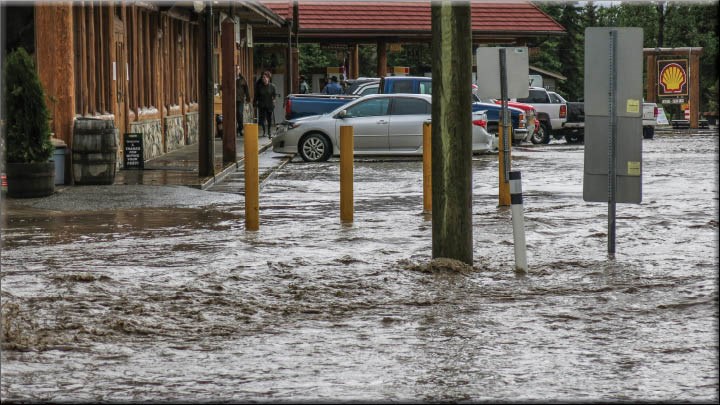Recent rainy weather may not have given rise to the flood damages of previous years, but for those who lived through the 2013 floods in southern Alberta, the psychological effects linger.
The mental health effects of floods manifest themselves in a number of ways, and it may take little more than prolonged rainfall or even just weather warnings to trigger anxiety and PTSD.
Older people, children, people living alone, or those already dealing with stressful life events remain especially vulnerable, according to a study done in Scotland on the long-term effects of major floods.
When prolonged periods of rain come this time of year, anxiety can rise as relentlessly as the water table.
In Redwood Meadows, Bruce Docherty got up in the middle of the night in the midst of the weather warning calling for the heaviest rainfall to find his 14-year-old son in the hallway, asking if they were going to be alright.
“He was just kind of standing there. The rain was coming down really hard and he was freaked out,” Docherty said. “He knows what trouble we went through with the previous flood and he worries a lot.”
Docherty said he tried to reassure his son that they were going to be OK.
The prolonged heavy rain affected Docherty himself. He was already awake due to the stress brought on by his own memories of 2013, when the basement he had just finished remodelling was washed out by the rising water table.
“It definitely triggers anxiety, and you lose sleep over it,” he said.
He works from home as an engineer and now has his office in the basement, but hasn’t continued with other planned renovations down there.
Even though his sump was dry the day after the heaviest period of the recent rainfall, he said he couldn’t relax completely because of memories from nine years ago.
“In 2013 as the sun came out that was when the water came up higher, and that’s what I anticipated this time – I thought it’s too weird we’re dry,” he said. “Something’s gonna happen here.
“It creeps up on you,” he added.
He said kids don’t get their news the way their parents did, and fearmongering on social media doesn’t help.
Cochrane mental health therapist Alison Mazur says one of the things parents can do to help children handle the stress in situations like this is to limit their access to media – social or otherwise.
“Limiting their media exposure, for sure, would be good,” she said, adding that providing reassurance is key.
During the 2013 flood, she had a client from Bragg Creek who was afraid of rising waters. Mazur’s advice involved a lot of positive reinforcement.
“You have to say, ‘No matter what happens, I can figure this out, I can handle it,’” she said.
Mazur advises people dealing with memories of past trauma to talk to others about how they’re feeling and focus on other things.
“Relaxation methods, too, whether that’s exercising, having a cup of tea, talking with friends,” she said.
Cochrane psychotherapist Sheena Shilton does trauma therapy. When dealing with what she calls anticipatory anxiety related to past events, the best thing is to be honest with kids and learn from the past.
“Put in place things that weren’t in place before. So, do we have the things we need so we can exit, and also everybody knowing what the plan is,” she said.
“The biggest thing is validating their concerns. It’s an opportunity for open conversation. Tell them we’re just being careful right now – and chose your words carefully.
Having a little backpack full of trinkets can go a long way for kids, and coping skills create calmness.
“You can say, ‘Hey son, if we have to leave, wouldn’t it be better to pack your bag just in case? Take your prized possessions, put them in a bag,’” Shilton said.
For those people without children who may be feeling anxiety, the advice is a little different.
Fear of the unknown will always be there, but there are mechanisms to minimize that.
“We can mitigate some anxiety in any demographic. Things like, we’ve been through this before, we kind of know what to expect. If I need to leave, what am I taking? If we have to go, how long do we have to prepare to go for?” she said.
Just having those ideas orchestrated helps, according to Shilton.
In 2013, Docherty’s wife Shawna and their two young boys were evacuated, and ended up staying in a trailer with relatives until they were allowed back into their home.
What they found when they returned was traumatizing. Docherty had just finished installing new flooring and walls downstairs, all of which had to be torn out after rising groundwater overwhelmed the sump pump.
Their neighbours went through similar property damage, and in the days that followed, impromptu work crews comprised of families, neighbours and friends went house to house on their cul-de-sac, carting out wet carpeting, ripping out swollen hardwood, and throwing out boxes of ruined memories.
The family across the street moved away in the aftermath.
For Docherty, the recollections are hard. The 2013 flood, it seems, has become the Flood of Memories.



